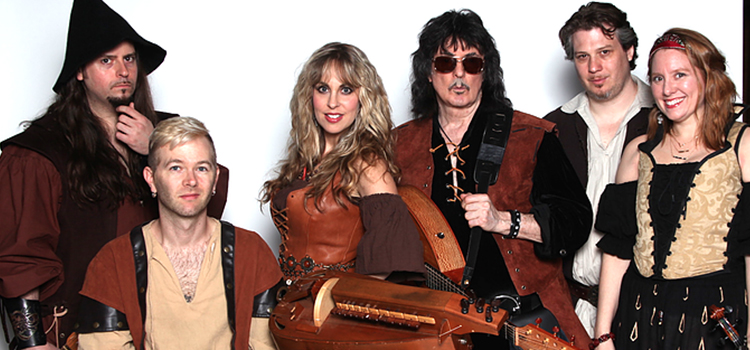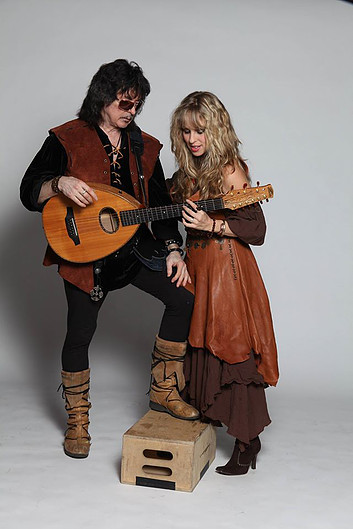
The medieval magic of Blackmore’s Night
Ritchie Blackmore has been behind the guitar of numerous classic-rock songs, songs like “Woman From Tokyo” and “Smoke on the Water” with Deep Purple and a cover of Russ Ballard’s “Since You Been Gone,” which was a hit for his band Rainbow — but he doesn’t want to talk about any of that.
In face, he won’t.
What Blackmore wants to talk about, though, is what has been his career for the past 14 years: Blackmore’s Night, the Renaissance-themed folk duo he fronts with his wife, Candice Night. Also featuring four “minstrels,” the sextet will perform Saturday, May 14 at the Sherman Theater in Stroudsburg.
Blackmore fell for Renaissance music after hearing David Munrow and the Early Music Consort of London in 1972.
“They were playing music for a series on BBC at the time,” Blackmore shared recently from his home on Long Island. “That’s where I first heard it, and after that, I just went bonkers for it, fiddling around for it.”
At first, since he was playing rock music with Deep Purple, Blackmore mostly just listened to Renaissance and medieval music. It wasn’t until he meat “a lot of German medieval minstrels in this castle” around 1986-87 that things changed.
“I just loved the way they sounded and played so much, I got more involved in it,” he said. “After a while, at the end of Rainbow (in 1997), I was playing more medieval music on my guitar than I was rock ’n’ roll.”
And it wasn’t until Blackmore met Night in 1989 that the soft-spoken, affable singer got bitten by the Renaissance — and performing — bug herself.
“I had gone up to his house in Connecticut, this big, old English Tudor house, very dark wood,” Night recalled. “It was in the middle of the woods, and it really set the scene of kind of going back to this other world.
“He was playing this music all the time, and eventually I moved in with him in 1991, and just being around the music and being in the middle of the woods, it was almost like the soundtrack of nature. It was really transporting me.”
Though both musicians — in addition to vocals, Night plays the penny whistle, shawm, gemshorn, recorder and other instruments — are inspired by this genre of music, they have different takes on it.
“I love the fantasy of it, the romantic visuals of it, the woman who is waving the handkerchief from the castle window to the knight who’s riding off on a white horse,” Night explained. “Whereas Ritchie pulls from very purist, traditional historically accurate texts or music and things like that, so we kind of both see the same inspiration in very, very different ways.”
AN ETHEREAL CONNECTION

Night has seen the response to Blackmore’s Night change since the band’s inception.
“I think when we first put the music out there, people thought that we were completely insane, or at least (Ritchie) because he’d been doing nothing but rock music for decades,” she said. “And it’s just grown in leaps and bounds. I think people bought (our music) for Ritchie’s name, and since then, it spread mostly through word of mouth. It’s a really grassroots kind of connection that we have with our fans.”
She likens their sound as the musical equivalent to romance novels.
“For some reason, it tends to really reach a lot of people, but you can’t narrow it down to one demographic or one genre, which is wonderful to me,” she said. “It bridges a generation gap — and gender gap — and winds up being a whole generational connection, which for us is so beautiful that whole families get to enjoy our music.”
Blackmore’s Night released its eighth album, “Autumn Sky” in January; the album is dedicated to the couple’s daughter, Autumn, who turns one this month.
While Blackmore’s Night’s music is the focal point of Saturday’s show at the Sherman, fans of the guitarist’s Deep Purple and Rainbow days might get treated to a Blackmore’s Night version of some of their favorite songs; the band has even covered a few on previous albums.
“Every night, we do ‘Soldier of Fortune’ (from Deep Purple’s 1974 album, ‘Stormbringer’),” shared Night, who once did a duet of Rainbow’s “Street of Dreams” with its original singer Joe Lynn Turner. “Every once in a while they crop up. We change the setlist every night — and he changes how he plays the songs every night … if he feels like playing anything from ‘Smoke on the Water’ to ‘Woman From Tokyo,’ he pulls them out.
“I think it’s great for him because he doesn’t have to play those songs, like when you’re in those bands, it’s expected to play those songs every night, but now, he can do it when he wants to. It’s nice to not have those stipulations put on you.”
Long rumored to be difficult to work with — Rainbow lead singer Ronnie James Dio reportedly left after “creative differences” with Blackmore, and Blackmore ousted other members during the course of the band’s existence — there was just something about working with Night that clicked, long before the two were a couple.
“We were friends before we got involved with each other,” Blackmore said. “We’d talk to each other about paranormal and metaphysical things that I don’t really speak to people about, and things just progressed from there. As a musician, she’s incredible.”
Night seconded their connection.
“To become incredible, such close soul mates with (Richie), like basically the first day of meeting him, we really clicked on so many levels,” she said. “He said that when I walked in the room, he felt like I was an old friend before we even really, really met. We were friends for a couple years before it really progressed, like any relationship does. It’s my Cinderella story — I’m waiting to wake up, actually.”
This article was originally published in the Weekender on May 11, 2011
Categories: Arts & Entertainment




